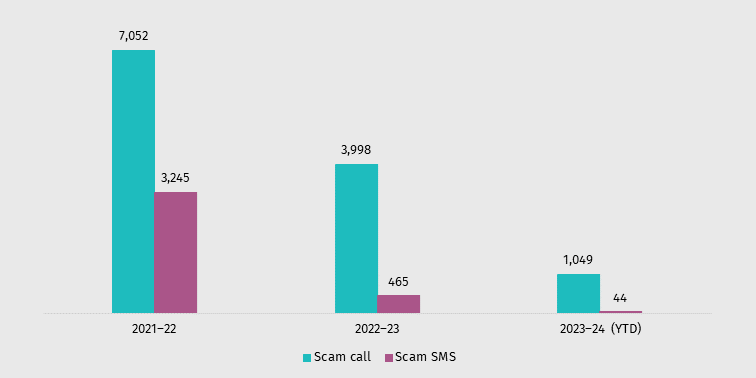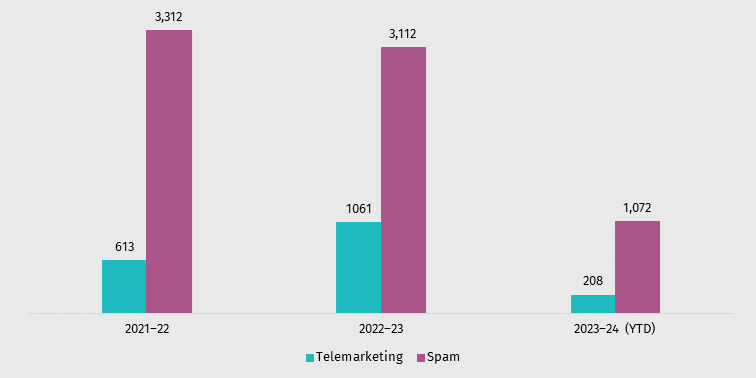Our key actions |
|
 |
DoorDash paid a $2 million penalty for breaching spam rules |
 |
We directed telcos Burst SMS, Twilio and Vonage Business to comply with scam rules |
 |
Telcos reported blocking over 225.5 million scam calls and over 79.4 million scam SMS in the quarter |
Our 2023–24 priorities
We have 2 compliance priorities for the 2023–24 financial year for unsolicited communications and scams:
- Combating SMS scams: working to prevent SMS scams from reaching Australians by enforcing existing rules, collaborating with Australian and global partners, and exploring new ways to stop scam messages that impersonate legitimate brands or organisations.
- Enforcing e-marketing unsubscribe rules: concentrating on businesses that don’t action opt-out requests, especially those that may cause significant harm. This includes direct marketing of gambling, alcohol and ‘buy now, pay later’ products and services.
Combating scams
We continue to take the fight to scammers to disrupt their activities and protect Australians.
This quarter, telcos reported blocking over 225.5 million scam calls and over 79.4 million scam SMS under ACMA registered rules.
We took action against Known Pty Ltd (trading as Burst SMS), Twilio Inc. and Vonage Business Inc. (Vonage) after our investigations found they breached anti-scam rules.
The ACMA found the vulnerabilities created by Burst SMS and Vonage were used by scammers to send SMS impersonating well-known brands such as – in the case of Vonage – the Commonwealth Bank, ApplePay and Australia Post.
Our investigations are helping to close weaknesses used by scammers.
We also:
- Commenced development of a Sender ID Registry to help prevent business message headers in SMS from being impersonated.
- Convened our Scam Action Telco Taskforce of government agencies, telcos, consumer reps and key organisations from across the economy to work on phone scam reduction initiatives.
- Supported the work of the National Anti-Scam Centre that was stood up by the Australian Competition and Consumer Commission on 1 July 2023 under the government’s Fighting Scams initiative.
- Issued consumer alerts about end of financial year tax scams, Father’s Day parcel delivery scams, fake invoices and bills scams scams and ACMA impersonation scams.
- Continued to work behind the scenes with telcos, government agencies and well-known brands to disrupt phone scams, including by providing data and intelligence products to telcos and government agencies.
Find out more about how to protect yourself from phone scams.
Enforcing e-marketing unsubscribe rules
Key actions and outcomes in our focus on unsubscribe rules include:
- DoorDash Technologies Australia Pty Ltd paid a $2,011,320 infringement notice after we found it breached the Spam Act by sending commercial emails after consent had been withdrawn. It also sent commercial texts without a functioning unsubscribe facility. The ACMA has also accepted a comprehensive 3-year court-enforceable undertaking from the business committing it to appoint an independent consultant to review its compliance with spam rules and to make improvements where needed. It must report regularly to the ACMA.
- We accepted 2-year court-enforceable undertakings from Webull Securities Pty Ltd and Wine Collective Holdings Pty Ltd after they sent commercial messages to their customers after they had tried to unsubscribe.
The ACMA gave 761 compliance warnings with targeted fact sheets to businesses identified from complaints to us that indicated potential issues with unsubscribe requirements.
Key compliance issue: Consent and paperless receipts
Many businesses are moving towards paperless receipts and are sending consumers proof of purchase electronically. We have seen an increase in the number of consumers being added to marketing lists without their apparent consent in connection with this practice. Examples include consumers providing their email address in store for the purpose of receiving a receipt and then being automatically added to marketing lists.
Adding consumers to your marketing list because they have provided their contact details to receive a paperless receipt does not meet the requirements of consent. The consumer has not expressly agreed to receive the marketing, and you cannot infer that you have their consent from a one-off purchase as there is no provable, ongoing relationship with your business. Better consumer friendly practice is to get the consumer’s express consent by making the information clearly available at the point consent is obtained.
A person who gives express consent knows and accepts that they will receive marketing emails or messages from your business. People can give express consent by directly agreeing to provide it, including via:
- filling in a form
- ticking a box on a website
- over the phone
- face-to-face.
Express consent should be informed by clear terms and conditions about what the consent is for, how long it lasts and how it can be withdrawn.
No matter what type of consent you are using, it is up to you to keep clear records to prove you have consent, including details about when and how it was obtained. This applies even if you use a list purchased from a third-party supplier.
Remember, under the Spam Act, it is up to you to prove that you have a person’s permission to send them marketing messages.
Learn more about the consent and unsubscribe laws.
Investigations and enforcement
We commenced one investigation and finalised 4 investigations in the quarter, with 8 underway at the end of the quarter.
Spam investigations took 3.2 months on average to complete and anti-scam investigations took 4.2 months on average to complete.
We monitored compliance with 21 court-enforceable undertakings in force during the quarter; setting out actions businesses must take to improve their compliance with spam and/or telemarketing laws.
View our enforcement actions for breaches of spam and telemarketing laws.
Check our enforcement actions for breaches of scam laws.
Finalised investigations

Complaints
We received more than 7,000 complaints from consumers about alleged breaches of telemarketing and spam laws in the first quarter of 2023–24:
- Scams were the top category for complaints. However, numbers were considerably lower compared to the same period last year. We have seen a yearly decline in the number of complaints about phone call and SMS scams for the Q1 period over the past 3 years. This suggests that the introduction of phone scam-disruption rules is having a positive impact.
- Building and maintenance was the top industry sector for complaints, with numbers increasing compared to the same period last year. This is attributable to an increase in complaints relating to phone calls about the Victorian Energy Upgrades scheme. We are working with the Victorian Essential Services Commission on this issue and may formally investigate where ongoing non‑compliance is suspected.
Complaints received by financial year

Please note: We have also received 18 complaints about commercial instant messages so far in 2023–24.
Complaints received about scam calls and SMS

Compliance alerts
Where we receive enough information, we alert businesses about potential compliance issues raised in complaints – one alert can relate to several issues or complaints.
Compliance alerts given to businesses

More information
Find out more about spam and telemarketing rules and what actions you can take, including making a complaint.
Subscribe to our newsletters to get updates about our actions on telemarketing, spam, and scams.
Access the data
Download the accessibility file for the charts in this report.
